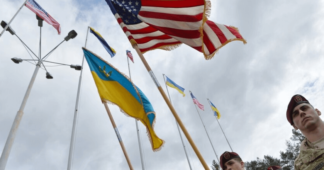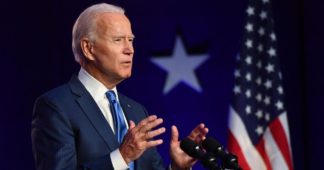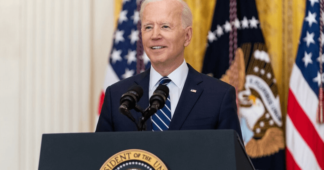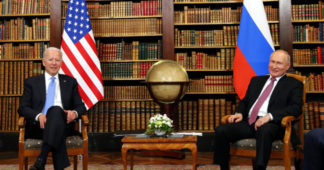January 8, 2022
The Honorable Joseph R. Biden
President of the United States
The White House
1600 Pennsylvania Avenue, NW
Washington, D.C. 20500
Dear President Biden,
On behalf of the fifteen undersigned organizations, we are writing to support your efforts to
engage diplomatically with Russia. Continuing engagement is necessary to avert a military
conflict that will harm the interests of the United States, harm innocent civilians in Ukraine, and risk spiraling into a potentially catastrophic war between the world’s two leading nuclear powers.
We greatly appreciate your decision to respond to the substantial Russian military deployment near Ukraine by engaging in direct talks with Russian President Vladimir Putin and arranging broader talks next week between Russia, the United States, and our NATO allies. We urge you to continue to pursue diplomatic progress, to promote de–escalation, and to seek negotiated solutions to disputes that avoid war.
We agree with Secretary of State Tony Blinken that “[d]iplomacy is the only responsible way to resolve this potential crisis.” We share his view that the “most promising avenue for diplomacy is for Russia and Ukraine to return to dialogue in the context of the Minsk II agreements,” and are encouraged that both the Putin and Zelenskyy administrations have reaffirmed their commitment to Minsk.1 The Minsk II accords would demilitarize the eastern Donbass region of Ukraine and guarantee meaningful political autonomy to the region while retaining Ukrainian sovereignty over the area and its borders. The United States should press both Ukraine and Russia to implement a workable version of the Minsk accords.
We also welcome your rejection of calls to station U.S. troops in or around Ukraine to protect against a potential Russian incursion, stating that such an effort is “not on the table.” You are right to emphasize that our “moral [and] legal obligation to our NATO allies” under Article 5 “does not extend to […] Ukraine”.2 Direct military confrontation between two nuclear superpowers would be enormously risky and irresponsible. Such a war would pose great risks in exchange for little if any benefit to the national security of the United States. To reduce the risk of war in the future, the United States should adopt a policy that rejects further expansion of NATO.
The United States has never before committed to use U.S. troops in a military defense of Ukraine and it should not do so now. Should your position on the introduction of U.S. troops into hostilities change for any reason, we trust you will seek prior congressional authorization as required under the Constitution and the War Powers Act of 1973 (which also covers any
assignment of U.S. forces to “command, coordinate, or participate in the movement of” foreign military forces engaged in ongoing or likely hostilities). 3
As President Obama has noted, Ukraine is a core national security interest for Russia in a way
that it is not for the United States, particularly considering that it is directly on the Russian
border but geographically distant from the United States. President Obama’s correct assessment that Russia will always have a stronger interest in Ukraine than the United States informed his decision to reject Congressional calls for lethal aid to that country. 4
Diplomacy is the only reasonable path forward for U.S.–Russia relations. We echo the call by
over 100 former U.S. officials and leading scholars who stated that, in addition to addressing
urgent security challenges, we must engage in a serious and sustained strategic dialogue with
Russia “that addresses the deeper sources of mistrust and hostility” while deterring Russian
military aggression.5 These dialogues must engage with President Putin’s explicit pursuit of
“reliable and long–term security guarantees” that would “exclude any further NATO moves
eastward and the deployment of weapons systems that threaten us in close vicinity to Russian territory.”
Russia perceives NATO expansion as a threat, stemming from the nature of NATO security
guarantees and a longstanding Russian perception that Western leaders violated past assurances regarding NATO expansion. It is in the interests of the United States, the region, and the world to address these and other root causes of tension with Russia as part of an ongoing strategic dialogue. Such a dialogue does not necessarily preclude the use of other mechanisms to deter Russia aggression that are appropriately scaled, do not harm innocent civilians, and do not risk a disastrous escalation into war.
Mr. President, you face a stark and profoundly consequential choice. We urge you to maintain
and deepen your diplomatic and realistic approach towards Russia and Ukraine, including by
continuing to refrain from provocative actions that could raise tensions. It is in the interests of the United States, our allies, the people of Ukraine themselves, and the world community that the disputes between our nations be settled peacefully.
Sincerely,
The Quincy Institute for Responsible Statecraft
Just Foreign Policy
Beyond the Bomb
1 U.S. Department of State, Office of the Spokesperson, “Secretary Antony J. Blinken at a Press Availability at the NATO Ministerial,” December 1, 2021, https://www.state.gov/secretary–antony–j–blinken–at–a–press–availability–at–
the–nato–ministerial/
2 The White House, Office of the Press Secretary, “Remarks by President Biden Before Marine One Departure,”
December 8, 2021, https://www.whitehouse.gov/briefing–room/speeches–remarks/2021/12/08/remarks–by–president–
biden–before–marine–one–departure–10/
3 U.S. Constitution, Art. I, § 8.; U.S. Congress. United States Code: War Powers Resolution, Pub. L. 93–148, §2,
Nov. 7, 1973, 87 Stat. 555.
4 The Atlantic, “The Obama Doctrine,” Jeffrey Goldberg, April 2016,
https://www.theatlantic.com/magazine/archive/2016/04/the–obama–doctrine/471525/
5 Politico, “It’s Time to Rethink Our Russia Policy,” Rose Gottemoeller, Thomas Graham, Fiona Hill, John
Huntsman Jr., Robert Legvold, Thomas Pickering, August 5, 2020,
https://www.politico.com/news/magazine/2020/08/05/open–letter–russia–policy–391434
Published at https://quincyinst.org/wp-content/uploads/2022/01/Jan8_Russia_Coalition_Letter.pdf
We remind our readers that publication of articles on our site does not mean that we agree with what is written. Our policy is to publish anything which we consider of interest, so as to assist our readers in forming their opinions. Sometimes we even publish articles with which we totally disagree, since we believe it is important for our readers to be informed on as wide a spectrum of views as possible.











